While your chances of getting attacked or killed by a bear are incredibly low, that doesn’t mean the risk doesn’t exist. Bears are becoming more habituated to humans, meaning that they lose their natural fear of humans. Thus, it’s become even more important to use bear repellents when in bear country.
There are a lot of options for bear repellents. Some are proven to work whereas other repellents are actually not recommended in bear country.
If you are not sure what bear repellent to bring, here’s what the research says about which ones actually work.
What’s the Best Bear Repellent? The Quick Answer
The best bear repellent is to make noise while hiking or camping so bears are alerted to your presence and leave before an encouter occurs. If you do see a bear and it doesn’t go away, then you can use an air horn or other noisemakers to scare it away. This doesn’t always work though, so be sure to have your bear spray ready to use in case of an attack.
Also Read: Bear Safety Outdoors: How to Get It Right
Don’t head into the wilderness unprepared! Get my PRINTABLE
Camping Cheat Sheets: An Illustrated Manual
Click to get your hands on this must-have camping companion!
Which Bear Repellents Are Effective?
Below are the most common bear repellents and what scientific research and experts have to say about whether they are effective.
Talking or Singing
Verdict: Effective
The vast majority of injuries from bear attacks occur from sudden encounters, particularly with females and their cubs.1, 2 Basically, the bears get startled and react defensively.
Talking or singing alerts the bear to your presence will drastically reduce the chances of having an encounter at all.
Virtually all bear experts, park rangers and other authorities on bear safety agree that talking is effective at repelling bears. If you are alone, go ahead and start talking to the trees while you hike.
Random personal note: The first time I hiked in bear country alone, it was really awkward to talk to myself. I ended up singing “Oh Susanna” as I hiked and felt slightly crazy. But it’s better to feel crazy than have a bear encounter!
Bear Bells
Verdict: Maybe effective but not recommended
The idea behind bear bells is that, like talking, the sound will alert the bear so it is not taken by surprise and thus less likely to attack. There is some limited evidence that shows they are effective. In one study, hikers wearing bell bears were just as likely to see a bear as hikers not wearing bells. However, the bear was much more likely to move away from the hikers wearing bells. By contrast, the bears were more likely to stand their ground or attack hikers without bells.
Despite this, bells are generally not recommended as a bear repellent. As one study pointed out, “Bells worn on clothing or on a backpack make minimal noise, do not carry, and are ineffective near rushing streams or under other noisy conditions.”
You’d have to use very loud bear bells for them to be effective – and it would be incredibly annoying to listen to bells dinging as you hike!
Some national parks even discourage the use of bells since some bears have become conditioned to associate the sound of them with the presence of food in a backpack.3 Hence the joke, “How do you tell grizzly poop from black bear poop? Grizzly poop has little bells in it.”
Music
Verdict: Not recommended
There is absolutely no evidence that playing music acts as a bear deterrent. True, it might prevent you from startling a bear by alerting it to your presence. But, even if this is the case, it is against the principles of Leave No Trace to play loud music in the outdoors!
Air Horn
Verdict: Effective
Air horns are an effective bear repellent. In one study, they were even effective in repelling polar bears 81% of the time!
Air horns are generally only used after you’ve seen a bear. You do not want to blast an air horn as you hike as this would be incredibly annoying to other hikers, and possibly also cause them to think that there is a bear in the area. However, some campers do fire off air horns before leaving their tents to scare away any bears which might be at the campsite.
To use an air horn effectively, you should fire it in quick bursts so the bear (or other animal) knows where you are.
It’s worth noting though that some bears aren’t scared off by the sound of air horns. While it hasn’t happened to me, I’ve heard lots of stories about bears lingering even when the campers repeatedly blast air horns or banged on pots and pans. It just goes to show how habituated some bears are becoming to human presence and why you need a defense (bear spray) in addition to bear repellent.
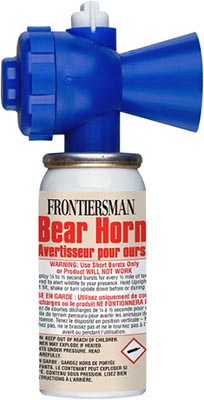
Frontiersman Bear Horn – available at REI
Bear Bangers
Verdict: Sometimes recommended
Bear bangers are a fairly new form of bear repellent. They are basically small explosives that you set off if you see a bear. The idea is that the banger will scare the bear away.
While some parks and rangers do recommend bear bangers, Parks Canada does not recommend them. They say that using bear bangers could put you in more danger. It’s not easy to accurately throw when you are terrified during a bear encounter. The banger might explode behind the bear which could send the bear running in your direction. Or the bear might become so scared that it reacts by attacking instead of running away.
There are also incidences of people getting injured from bear bangers.4 If you are going to use bear bangers, make sure you practice with them first!
Ultrasonic Bear Repellents
Verdict: Not recommended
Ultrasonic bear repellents blast out a frequency which is inaudible to the human ear but bears can still hear. The idea is that the sound will alert bears to your presence or scare them away. Because these devices are silent, they are preferable to wearing annoying bells.
There is some evidence that ultrasound bear repellents work. However, these studies were done with huge speakers. It’s not practical to bring this gear around hiking or even car camping. And it’s not clear whether smaller, portable ultrasonic bear repellant actually work.
Effectiveness aside, it’s also possible that ultrasonic noise could be bad for your health. Even though you can’t hear it, the frequencies can cause headache, nausea and other bad side effects.5
Ammonia
Verdict: Maybe effective
Ammonia has a very strong smell that bears dislike. You can use it as a bear repellant at your campsite. Just put some ammonia in a spray bottle and spray it around the perimeter of camp. Or, to minimize environmental damage, you can set a few cups of ammonia around the campsite.
While bears definitely don’t like ammonia, there is little evidence that ammonia will keep away bears away from food. In one study, bear bait was sprayed with ammonia. Yet the ammonia didn’t keep the bears away any longer compared to the control bait. Despite this, ammonia is still recommended by the Forest Service and other agencies as a good bear repellant.
One thing you definitely don’t want to do is spray a bear with ammonia. Ammonia is very strong and can destroy the bear’s nasal passage. The bear then won’t be able to sniff out the food, meaning you’ve essentially killed the bear.6, 7, 8
Electric Bear Fencing
Verdict: Very effective
While obviously not useful for hiking, electric bear fences are proven to be effective in keeping bears away. They’ve been used as far back as 1913 in Yellowstone to keep bears out of trash areas. They are also regularly used by beekeepers and farmers to keep out bears. One study found electric fencing nearly as effective as bear canisters in keeping bear away from bait.9
Electric bear fences don’t actually harm the bear (or any person who happens to come in contact). Instead, they give the bear an unpleasant jolt and thus discourages it from seeking food in human areas. The fences are sometimes used to prevent bears from becoming food-conditioned.10
The brand UDAP sells a portable electric bear fence. They have an ultralight model (3.7lbs) which runs on two D batteries. The batteries will keep the fence charged for about 5 weeks.
*Even if you get an electric bear fence, you still need to practice good bear avoidance habits. Never keep food or other bear attractants in your tent or around your campsite.
Strobe Lights
Verdict: Not recommended
A lot of people recommend shining strobe lights at bears to scare them away or putting motion-sensor ultra-bright strobe lights around camp to keep bears out. There is very little evidence that strobe lights are effect bear repellants though, especially in the long term.
One study on captive bears found that strobe lights didn’t affect the bears at all. A different study did find that motion-sensor strobe lights kept bears and some other animals away from deer carcasses. However, those lights were also accompanied by noises so it’s not clear whether the noise or light or combination of them scared the bears away.
On the flip side, there is plenty of anecdotal evidence of bears getting pissed off from strobe lights. Because who loves having an annoying light shone in their eyes?
Even if strobe lights do repel bears, it isn’t likely to last for long. The bears will quickly realize the light isn’t linked to anything harmful and will stop being deterred by it. For these reasons, strobe lights aren’t recommended as a bear deterrent.
If you want to use motion-sensor lights around your campground, just get normal lights. The light will alert you to any wildlife intruders wandering around camp so you can start sounding your air horn and get your bear spray ready.11, 12, 13, 14, 15
Dogs
Verdict: Not recommended
Hiking or camping with your dog will not keep bears away. On the contrary, your dog puts you at a higher risk of having a bear encounter or attack – especially if you let the dog off the leash. Dogs are known to do things like chase bear cubs or even threaten adult bears, which in turn can lead to attacks.16
Whistle
Verdict: Not recommended
Blowing a whistle as you hike down a trail will alert bears to your presence, thus reducing the risk of startling a bear. A very loud whistle can also be used to scare away bears if you encounter one. However, it is still generally a bad idea to use a whistle as a bear repellant.
The reason is because whistles are meant to signal that you are in danger. So, if you start blowing your whistle like crazy, a nearby hiker might rush to help you – thus putting them at risk of running right into a bear.
Save the whistles for true emergencies. Stick to loud talking instead and, if you actually see a bear, then shout or start blasting that air horn.
*Yes, you are supposed to use three short blasts on the whistle to signal you need help. But a lot of novice hiker don’t know this, so someone could rush to see if you need help.
Bear Spray
Verdict: Very effective
Bear spray is often incorrectly called a repellent or deterrent. You do not want to do things like spray around your campsite with bear spray. Nor do you want to spray it on your backpack before hiking. The lingering smell of bear spray can actually attract bears!
Really, bear spray should be used as a self-defense item. If a bear starts to charge and attack, you spray it in the bear’s face. Bear spray is proven to stop bears from attacking. There are really no good bear spray alternatives.
Note that bear spray is useless if you aren’t ready to deploy it when needed. Keep bear spray in holster or somewhere else it can be reached within a second’s notice. And make sure you’ve actually practiced grabbing the bear spray and removing the safety.
*UDAP, CounterAssault, Frontiersman and Guard Alaska are all good brands of bear spray. You can get them at Amazon or REI.
Also read: How to Use Bear Spray
Do You Need Repellents for Black Bears?
Compared to brown bears, black bears are much less aggressive and usually won’t charge or attack people. Because of this, many people say that you do not need to carry repellent when in black bear country. However, because black bears are much more common than brown bears, the statistics show that you are just as likely to be attacked by a black bear than a brown bear. Thus, it is smart to carry bear repellent in black bear country and not just in grizzly territory.
Bear Repellents Aren’t a Substitute to Smart Camping Practices
Even if you have a full arsenal of bear repellents, you should still practice bear-smart camping techniques. This includes things like making sure you don’t leave scented items in camp and disposing of waste properly.
For more info, read this post on how to keep bears out of your campsite.
Image credit:”Got our bear spray…” (CC BY 2.0) by sf-dvs


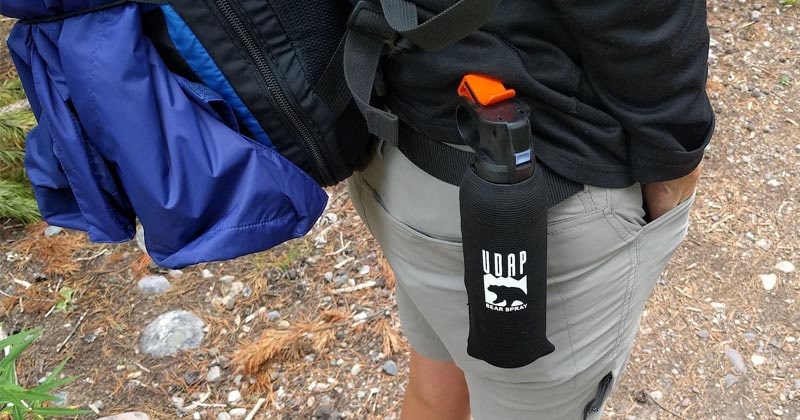
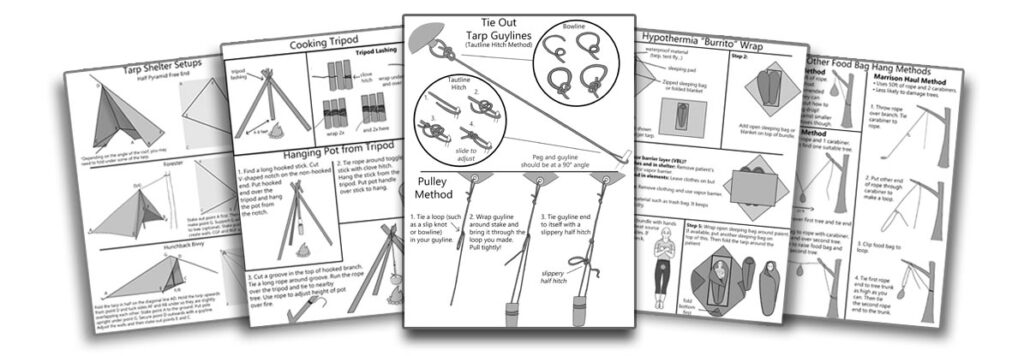
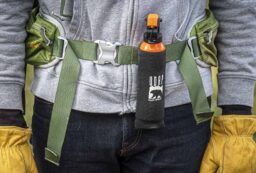
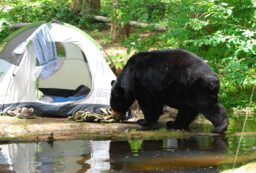
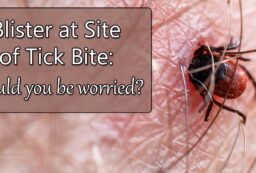




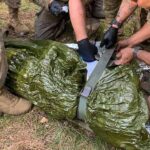
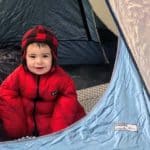
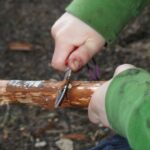
7 Comments
Bill
December 6, 2022 at 6:30 pmHunting in Idaho grizzly and black bear country requires quiet predatory movement in ways threatening to bears. I’ve learned to spray around my campsite every evening with fresh ammonia to keep bears away. I store my food in, and tailgate cook, out of my locked cargo trailer. While hunting, I carry both bear spray and bear caliber revolver as a backup. I always use odorless hygiene products while hunting. Its up to us to take precautions against unwanted bear encounters, especially with grizzlies because they are aggressive with no fear of humans. Remember this; It is a federal offense to shoot a grizzly. The self-defense shooter is guilty until proven otherwise.
Maria Morrow
April 4, 2023 at 5:41 pmAppreciated this, as I run in a semi-urban area that sees a fair share of bears. I don’t really want to talk loudly while I’m trying to run. And I do sometimes play music on the back trail (away from people) so I’m sorry to hear that doesn’t help. I guess the air horn is the best option.
Mike Sutton
May 31, 2023 at 2:28 amI recommend to start your car/truck engine and rev it up to scare away the bear and at the same time honk your horn. I once used my suv truck horn to scare away a pack of wolves who were in my remote campsite at night, it worked they immediately ran away.
Diane
May 31, 2023 at 5:13 pmThat’s a great tip. Unfortunately, it doesn’t apply to me or a lot of people since I almost always walk into camp so no vehicle nearby 🙂
Theo
July 2, 2023 at 12:50 amHi, would you look over the paragraph with “… carry bear repellent in brown bear country and not just in grizzly territory.” I think you meant black bear country. I enjoyed the article, thank you.
Diane
July 3, 2023 at 2:15 pmThanks for catching that! I’m going to correct it now 🙂
smotty
July 7, 2023 at 11:42 amFor the most part its already known that majority grizzly bear attacks are usally from a surprise face to face of a female and her cubs. So if your out hiking in the woods ,playing music,and talking or singing a hiking song like “ants go marching”. Doing so will definitely let every animal know( including mama bears to avoid a surprised grizzly attack) that humans are coming. That the mama bear will skedaddle with her cubs when hearing you coming. That they will be long gone before you can even see or encounter them or any other wildlife for that matter. If your hunting, and you are the one startled by a grizzlly and 2 cubs. Questions how aware they are of their surroundings, especially getting older it gets harder to hear and more difficult to see things further away. That the older they get the smaller their area of awareness gets then it comes to the fact they shouldn’t be hunting by themselves anymore. Actually nobody should be in the woods alone in first place and should always have someone to watch your backs.( Hunting or Not) .Plus any encounter with another person will be in both your favors of a Non- grizzly(with cubs) attack.To make them think twice(2 of you) an d they go the other way instead.
Going out hunting by yourself in then woods. Is about the same as going out a boat in the ocean 70 miles offshore by yourself. Then hopping out into the ocean to go spearfishing for tuna. If something happened or you got attacked by something. Nobody is around to help you get back to the boat/car .Even if someone saw your vessel/vehicle and found it empty they would have no idea where you are. That you could have slipped/tripped and hit your head (getting out of boat/on a rock) to knock you unconcience. That even floating/laying 100 ft. away and it would be very difficult for anyone to find you in the Ocean/Woods. Let alone if you were attacked by a large preadator and 1000+ feet from your transportation. Actually there are more things that can kill, injure, immobilze, infect, and attack you in the woods than spearfishing in the ocean. That its more likely to be hit by a boat and drowning while spearfishing than being eaten by a shark..(A sharp spear works very well to stop a shark attack).You can find many youtube videos of spearfishers vs. sharks prove 99.999% of them( in clear water).are able to fend off sharks even keep great whites at bay without any injury after a few spear jabs.
Cant say that would work for grizzly bears since (like many us )they fight each other for fun. That if you stab them with a sharp stick it will only piss them off and each time you poke them.will justnmake them madder each time you. Plus in the woods there gravity can hurt you such as tripping/slipping onto sharp/hard things,off a cliff, or stuck down in crevace/hole. Falling rocks, widow maker braches,dropping your gun accidentally get shot, or get stuck in some quick sinking mud. even if your alive after any of those but you end overnight to freeze to death or fall into some water and get hypothermia. Then there are also poisonous snakes,spiders, plants and insect to worry about. Although they might not kill you they will definitely ruin your week or life if you get Lyme disease. Then you have to worry about the things that cam attack you such as wasps, bees,wild boars,male deers,mountain lions,black bears and then finally the grizzlies. And if you ended up injured with a broken leg good luck crawling back to your vehicle miles away dragging yourself over dense brush and thru everything on the ground I listed above.
So now I wall ask, if you wouldn’t drive out 70 miles out onto the ocean to go spearfishing by yourself. Then why would you think its a better idea to drive you car 70 miles into the.woods to go hunting by yourself?
Because neither of those are safe without risk. Its just that the latter hunting option poses a much,much greater risk for something bad to happening to them. That its safer and a better idea to go spearfishing out in the deep ocean by yourself. Than it is to go and hunt by yourself in the woods.
.
.